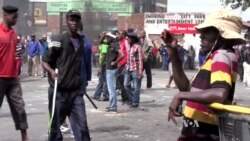Many Malawians fled South Africa early this year after xenophobic attacks on African immigrants. But many quickly found life was no better at home and have returned to South Africa – often illegally and without jobs, and facing the tough task of having to start over.
Vincent Phiri is among the tens of thousands of immigrants who fled South Africa amid a wave of xenophobic attacks earlier this year.
He had seen TV reports in Malawi that seven of his countrymen were killed in the violence, but in April, at the height of tensions, Phiri decided to make a risky return to Johannesburg.
Poverty at home in Malawi, he said, compelled his return to this notoriously dangerous city.
“South Africa is like, I don’t know – you are moving on top of a crocodile," he said. "Any time it can turn and bite you."
Juma Kaweza Saiti, who runs a furniture factory in central Johannesburg, near the site of some of the worst scenes of violence, says he’s seeing more xenophobia victims return to South Africa, just months after fleeing.
“They come from families which are extremely poor, families which can’t offer anything to them," said Saiti, who also leads a migrant advocacy organization called Light of Hope for Africa. "So it’s a matter of a choice to them: it’s either to stay behind and live in those types of conditions, or go back to a place where they are facing violence.”
Malawi repatriated some 3,200 of its citizens after the violence, at a cost of about $450,000. While the exact number of returnees is unknown, Malawian ex-pats here say at least 100 people have returned in recent weeks.
According to Saiti, many repatriated Malawians have been told they couldn’t renew their passports for five years, which means that those who are returning are often doing so illegally – at great risk.
“They pay huge sums of money to get here, and when they get to the border post itself, they can’t pass there because they don’t have passports, so they have to divert and go into the bushes," he said. "Actually they meet a lot of challenges there. They get raped, they get mugged, their belongings are taken away.”
But that hasn’t stopped the flow of returnees. Factory worker Sinoya Milward said his uncle was among them.
“He is failing to stay in Malawi because of problems like poverty and difficulties in how he can raise money to feed himself,” he said.
Many of these men say a life of danger in South Africa is better than a life of hunger at home.
It’s a gamble, they say, but one they’re willing to take.





